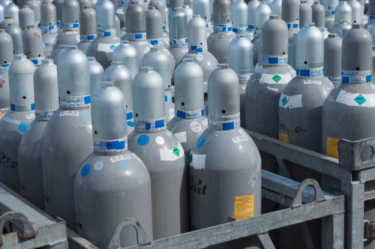Blog | 16 Jan 2024
As Consumer and Business Spending Slows, Which Sectors Will Grow in 2024?

Concerned about the lingering effects of inflation, rising interest rates, and the impact of geopolitical turmoil, many consumers are tapping the brakes on spending while businesses reconsider their investment strategies.
Despite this slowdown, certain industries will continue to offer growth opportunities in the coming year.
Which sectors have the best chance to grow in 2024, and where will these industries grow fastest? Oxford Economics explores these questions in several research reports.
Slowbalisation creates growth opportunities
The pace of globalisation is slowing as advanced economies increasingly prioritise national industry, trade, and security over freer trade. Contrary to certain opinions, however, Oxford Economics believes that the world is not moving toward deglobalisation. It’s more of a flattening or levelling off in global integration, or what we refer to as “slowbalisation.”
Look for this shift to create opportunities for investors in commercial real estate (CRE). If advanced economies continue on the current path, it would increase the demand for manufacturing and distribution facilities in markets that are more aligned with end consumers. Additional demand may also arise in areas where reshoring, near-shoring, or friend-shoring is popular.
Industrial CRE growth may grow most dramatically in the US. Recent legislation such as the CHIPS and Science and Inflation Reduction Acts doubled the volume of US manufacturing construction spending between 2019 and mid-2023. Private investment in clean energy, batteries, electrical vehicles, and semiconductors has already topped US $510 billion. States such as Arizona, Kentucky, Georgia, and Tennessee are likely to be the main beneficiaries of this investment in 2024.
In manufacturing and services, certain sectors will thrive
Two manufacturing sectors and two service sectors are also likely candidates for growth next year, according to a recent Oxford Economics report. Transport equipment manufacturing is shaping up to be the largest contributor to global manufacturing growth in 2023, with strength persisting into 2024, particularly aerospace.
China’s reopening resulted in a pickup in broader manufacturing this year, which will persist into 2024. The semiconductor market will help revive high-tech manufacturing in the Asia-Pacific region, with a gradual upturn in the chip cycle projected in this briefing.
On the services side, consumers will continue prioritising spending for experiences such as travel and eating out – services not available to them during the pandemic. What’s more, new technologies supporting data storage, transmission, and processing are contributing to robust growth in the information and communication sector.
Leisure travel leads the way, with a more international flair
Despite today’s current economic pressures, leisure travel has recovered vigorously and ahead of business travel. In nearly all regions, the number of leisure trips taken this year is just below the prior peak in 2019. Unlike other economic downturns, which caused consumer travel spending to fall, consumers are now prioritizing travel, with domestic travel leading the way but with international also growing.
For 2024, Tourism Economics, an Oxford Economics company, expects the demand for leisure travel to remain robust. Many households still have significant excess savings, leading to a continued prioritization of travel. In addition, China re-opened borders for international travel later than many other markets, and pent-up demand will still be realised in 2024.
But instead of traveling to their usual destinations or restricting trips to domestic locations, consumers are likely to seek greater diversity. Holidaymakers are looking beyond the traditional sun and beach trips and are seeking more authentic experiences in a wider range of destinations. However, there is some price sensitivity in destination choice.
One potential impediment to the growing travel market is the rise of threats created by climate change. Extreme weather conditions, such as wildfires and flooding, inhibited travel this year to some countries. As these weather events become more frequent and severe, this report suggests that they could impede the growth of leisure travel in some global locales.
How the energy transition drives growth
The energy transition will also play a role in the growth of certain sectors. Industries not only need to decarbonise their own activities but also produce low-carbon technologies that can help other sectors.
Low-carbon hydrogen may be the best choice for industries where electrification is implausible, such as steelmaking and chemicals. Oxford Economics expects strong growth in renewables, but a lack of investment in electricity grid updates may slow that expansion.
Because low-carbon technologies often rely on minerals such as copper, lithium, nickel, and zinc, mining companies in areas where those minerals are plentiful could benefit. The emergence of low-carbon manufacturing may catalyse growth in sectors such as non-ferrous metals, iron and steel, chemicals, electrical engineering, and construction.
To better understand patterns for sector growth in 2024 and beyond, turn to economics-driven insights from Oxford Economics. We unlock the power of economics to help companies in multiple industry sectors make intelligent, responsible decisions – for today and the future.
Tags:
You may be interested in

Post
Europe: Nuclear energy has likely peaked, despite a new embrace
The energy crisis has provoked a fundamental rethink of nuclear energy across Europe and many governments are now committing to building new reactors or delaying phaseouts. But we estimate phaseouts will still offset new additions for some years.
Find Out More
Post
Further industrial gas savings would come at steep cost for Germany
German industry has been successful in reducing its consumption of gas relative to previous years, particularly in the second half of the year.
Find Out More
Post
Services inflation to take centre stage in 2023
Over 2023, we expect global food, energy, and goods inflation to fall sharply. That said, the degree to which services inflation declines will also determine how quickly headline CPI inflation drops.
Find Out More
